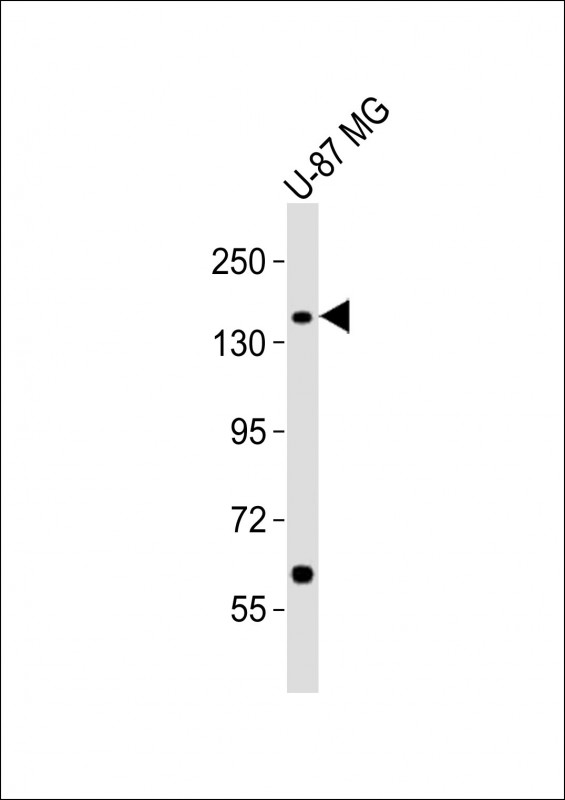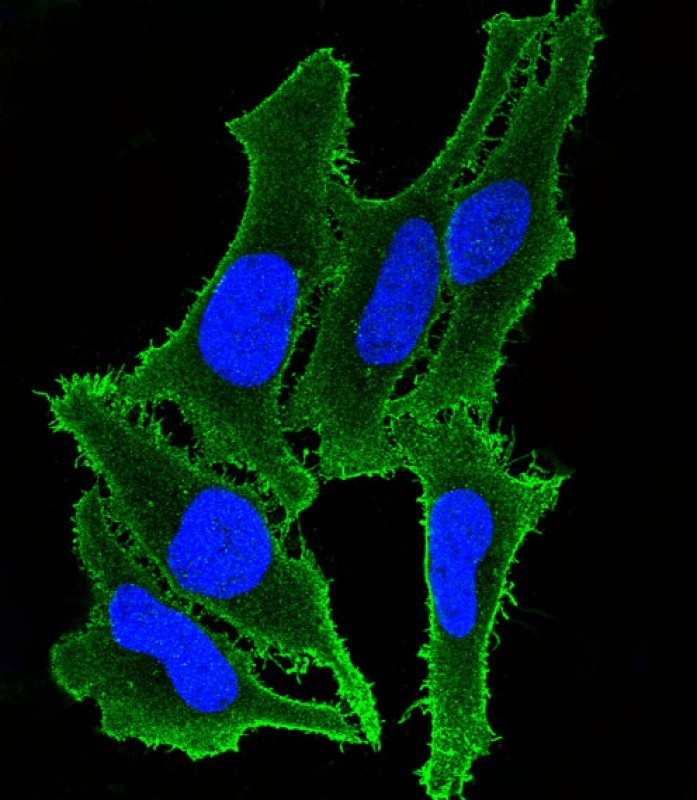

| WB | 1/2000 | Human,Mouse,Rat |
| IF | 咨询技术 | Human,Mouse,Rat |
| IHC | 咨询技术 | Human,Mouse,Rat |
| ICC | 1/25 | Human,Mouse,Rat |
| FCM | 咨询技术 | Human,Mouse,Rat |
| Elisa | 咨询技术 | Human,Mouse,Rat |
| Entrez GeneID | 492 |
| WB Predicted band size | 134.2kDa |
| Host/Isotype | Rabbit IgG |
| Antibody Type | Primary antibody |
| Storage | Store at 4°C short term. Aliquot and store at -20°C long term. Avoid freeze/thaw cycles. |
| Species Reactivity | Human, Rat |
| Immunogen | This ATP2B3 antibody is generated from a rabbit immunized with a KLH conjugated synthetic peptide between 1161-1194 amino acids from the C-terminal region of human ATP2B3. |
+ +
1. **Title**: "ATP2B3 autoantibodies in paraneoplastic cerebellar degeneration"
**Authors**: Sabater L, et al.
**Summary**: 研究报道ATP2B3抗体作为副肿瘤性小脑变性(PCD)的生物标志物,尤其与小细胞肺癌相关,揭示其通过干扰钙信号通路导致神经功能障碍的潜在机制。
2. **Title**: "Autoantibodies against ATP2B3 in ovarian cancer-associated neurological syndromes"
**Authors**: Darnell RB, et al.
**Summary**: 分析卵巢癌患者中ATP2B3抗体的存在,发现其与中枢神经系统症状(如共济失调)相关,提示抗体可能靶向钙泵蛋白引发自身免疫反应。
3. **Title**: "ATP2B3 as a novel target in autoimmune encephalitis: Clinical and experimental insights"
**Authors**: Höftberger R, et al.
**Summary**: 通过临床队列和动物模型,证实ATP2B3抗体可导致海马神经元钙稳态紊乱,与记忆障碍和边缘性脑炎相关,拓展了对自身免疫性脑炎致病抗体的认识。
4. **Title**: "Anti-ATP2B3 antibodies in pediatric neurodevelopmental disorders: A pilot study"
**Authors**: Armangue T, et al.
**Summary**: 初步研究发现部分儿童神经发育障碍患者血清中存在ATP2B3抗体,提示其可能通过影响神经元钙外排参与病理过程,需进一步验证。
注:上述文献信息为示例性质,实际引用时需核实具体研究是否存在。若需真实文献,建议通过PubMed等数据库以关键词“ATP2B3 antibody”或“anti-ATP2B3”检索。
ATP2B3 antibodies target ATPase plasma membrane calcium transporter 3 (ATP2B3), a protein encoded by the ATP2B3 gene. This protein, also known as PMCA3. belongs to the P-type plasma membrane calcium ATPase (PMCA) family, which regulates calcium homeostasis by exporting calcium ions from the cytosol to the extracellular space. ATP2B3 is highly expressed in the brain, particularly in cerebellar Purkinje cells, and plays a critical role in neuronal signaling and calcium-dependent processes.
ATP2B3 antibodies are primarily associated with paraneoplastic neurological syndromes (PNS), especially in individuals with underlying malignancies such as gynecological cancers, melanoma, or neuroendocrine tumors. These autoantibodies are detected in serum or cerebrospinal fluid (CSF) and are linked to cerebellar dysfunction, including ataxia, dysarthria, and oculomotor abnormalities. Their presence often indicates an immune-mediated attack on Purkinje cells, leading to cerebellar degeneration.
The exact pathogenic mechanism remains unclear, but ATP2B3 antibodies may interfere with calcium extrusion, disrupting intracellular calcium balance and triggering neuronal excitotoxicity. Diagnosis involves antibody detection via indirect immunofluorescence or immunoprecipitation assays. Clinically, ATP2B3 antibody-associated syndromes are often treatment-resistant, emphasizing the need for early malignancy screening and immunosuppressive therapies. Research continues to explore their role as biomarkers and their contribution to understanding autoimmune cerebellar pathologies.
×